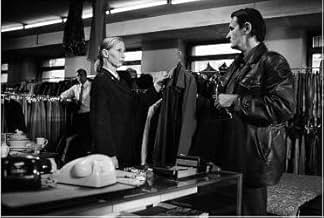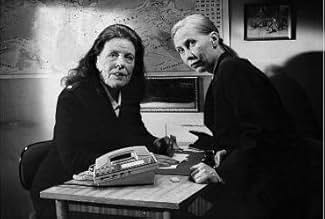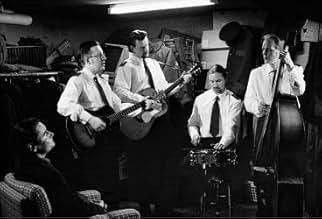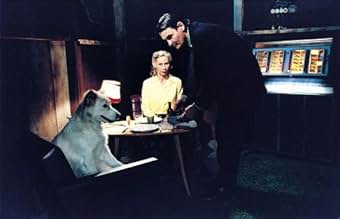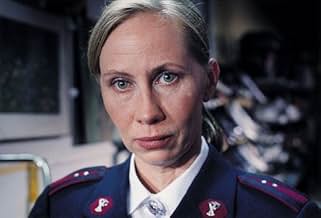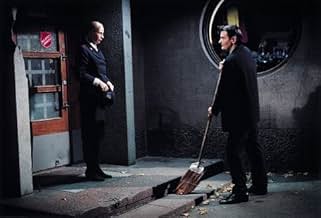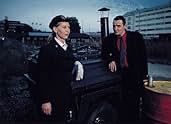जब 'एम' हेल्सिंकी आया, तब उस पर शातिर तरीके से ठगों द्वारा हमला और फिर, डाक्टरों द्वारा मृत घोषित किया जाता हैं. वह पुनर्जीवित होता हैं, लेकिन अपने अतीत या पहचान की कोई याद नहीं होती. फिर से... सभी पढ़ेंजब 'एम' हेल्सिंकी आया, तब उस पर शातिर तरीके से ठगों द्वारा हमला और फिर, डाक्टरों द्वारा मृत घोषित किया जाता हैं. वह पुनर्जीवित होता हैं, लेकिन अपने अतीत या पहचान की कोई याद नहीं होती. फिर से अपना जीवन शुन्य से आरभ करता हैं, लेकिन उसका अतीत अनिवार्य रूप से उसका पीछा नहीं छोड़ता है... सभी पढ़ेंजब 'एम' हेल्सिंकी आया, तब उस पर शातिर तरीके से ठगों द्वारा हमला और फिर, डाक्टरों द्वारा मृत घोषित किया जाता हैं. वह पुनर्जीवित होता हैं, लेकिन अपने अतीत या पहचान की कोई याद नहीं होती. फिर से अपना जीवन शुन्य से आरभ करता हैं, लेकिन उसका अतीत अनिवार्य रूप से उसका पीछा नहीं छोड़ता हैं.
- 1 ऑस्कर के लिए नामांकित
- 21 जीत और कुल 27 नामांकन
फ़ीचर्ड समीक्षाएं
At the story's center we find a nameless man (Markku Peltola), who arrives in Helsinki for unknown reasons. That same night, he's brutally assaulted by a group of punks. This incident makes him look dead, although we immediately learn he is alive, if completely amnesiac. With no idea of who he is or what he's supposed to do, he starts looking for a home and an employment. He manages to rent a "house" in the city outskirts (don't miss Sakari Kuosmanen as the landlord) and befriends Irma (Kati Outinen), a social worker who tries to help M (in lack of a better name, and given "X" is quite overused) as much as possible. It is this friendship, which slowly evolves into something deeper, that truly motivates the protagonist in his pursuit of a better life.
The Man Without a Past strikes us because, unlike other films involving amnesia, it makes us hope M won't recover his memory: what he experiences throughout the movie, the people he meets, that's what really matters. It's a little bit like a road movie (they never end with the characters reaching their destination), only this time the voyage involves the mind and the spirit. It's a similar voyage the director asks the audience to join, as he artfully explores human life and its chances of improvement.
Moving and reminiscent of Italian neorealism (De Sica, Rossellini, Visconti), The Man Without a Past is a flawless reflection on how happiness is to be found anywhere, no matter the circumstances.
The main actor, Markuu Peltola, is perfect for this movie with one of the most deadpan faces you'll ever see. He is amazing to watch and Kati Outinen, as his love interest, is similarly strange and fascinating. Part of their charm are their unusual looks. This is not a romance between people who look like your normal handsome film stars.
Simply, this is just something very different from anything you've seen, a combination of drama, comedy and romance with some of the strangest dialog I've ever heard on film. If you appreciate dry humor and a bizarre but touching story, you should see this.
There are lots of puns visual and otherwise with the threads of incompetent cops, doctors, nurses, employment office workers interwoven with a comical wannabe bad-guy overseer, a rock'n roll Salvation Army band, a torch-songstress SA Major and the philosophical hero who honestly can't remember.
Check this one out without fail. It's pure fun...but just don't expect it run along at breakneck speed ala Hollywood...!
It permeates Christian values without sermons, priests, or any religious hard sell (a small poster of Christ in a booth of the Salvation Army is an exception). Philosophically, it presents Tabula Rasa or a clean slate to begin life anew. The film tends to be absurdist (not even a moan emanates from brutalized victims of violence, broken noses are twisted back painlessly, victims of violence emerge from shadows to mete out justice). The film recalls shades of the brilliance of Tomas Alea's early Cuban films and the humanity of Zoltan Fabri's Hungarian cinema.
The film presents entertainment of a kind that would be alien to Hollywood--a cinematic essay on human values that seem to be a rare commodity the world over. There is no sex; there is no need for it. The poor who live in garbage bins and in empty containers, are rich with pockets full of kindness, helping each other without any expectation of a reward. The rich and powerful (the ex-wife and her lover, the policemen, the hospital staff, the official who rents out illegal living space) seem bereft of true feelings or any human kindness. The poorer sections of society (the electrician, the restaurant staff, the family who nurses the main character, the Salvation Army staff) do good to others, care about others and expect nothing in return.
The film is an affirmation of Christian values without preaching religion. The main female character in love with the man, is ready to sacrifice her love because she genuinely respects marriage vows and even brings a "train" schedule to send off her lover to his wife. The art of giving is sanctified. A man who employed workers believes in paying his workers, even if it meant robbing a bank to do so. A lawyer argues a case well because he likes the Salvation Army. Symbolically, even half a potato among six or eight harvested is given away to some stranger wanting to eat it and avoid scurvy! Again, symbolically there is rain on a clear day to help grow the few potatoes...
The film provides humour of a quaint, Finnish variety. A timid dog that eats leftover peas is called Hannibal--a male name one can associate with a king or even the cannibalistic Hannibal Lecter--even though the dog is female. There are swipes taken against the government and its associated machinery (antiquated laws, North Korean buying Finnish banks, retirement benefits, strikes and strikers, bank staff, corrupt banking practices).
Trains play a crucial role in Kaurismaki's screenplay. It begins and ends the film. It also punctuates the film, when the past is revealed, briefly.
There are possible flaws in the film--the blue tint when the children spot the injured man. The unexplained Japanese dinner with Sake and Japanese music on the train. The significance of the cigar in the script is elusive. The choice of songs, however good, seem to be haphazard.
The script is otherwise brilliant. In glorifying the detritus of society, Kaurismaki seems to affirm there is indeed a link between the tree and falling dead leaf (with reference to a comment by a character in the movie). The train moves on. Forward, not backwards!
Minimizing the world into a man, a woman, a dog and trains, Kaurismaki serves a feast of observations for a sensitive mind--a tale told with a positive approach to move on and seize the day. It is a political film, an avant garde film, a comedy and a religious film, all lovingly bundled together by a marvelous cast.
Finland should thank Kaurismaki--he is her best ambassador. He makes the viewer love the Finns, warts and all!
This second installment in Aki Kaurismaki's projected "Finland Trilogy" is a heart-warming fable about a man (Markku Peltola) who loses everything, including his identity. After M, as he is referred to for the rest of the film, dozes off on a park bench, he is awoken by a trio of thugs who brutally beat him up, steal his money and toss his wallet and identity papers into the trash bin. In the hospital, he is pronounced dead by the doctors, but by some miracle he springs back to life but with no memory whatsoever of his past or his identity. Now a penniless amnesiac, he has to build his life from scratch. Without knowing a single person (and without a single person knowing him), he must try to survive, but he soon acquires a melancholy dog named Hannibal and falls in love with Irma, a lonely salvation army soup kitchen volunteer. Of course, his past does catch up with him, but it only works to point out what's really important in his future life.
Kaurismäki usually champions the outcasts of society and here it's no different. He once said: "I make films for the unemployed, but since they don't have money to buy cinema tickets I generally have no audience." Of course, Kaurismäki has a huge audience by now, but no matter how simple and accessible the story in the film might look, he still manages to blend romance, quirky comedy and social commentary, seemingly effortless into the film's narrative.
Most of the humor doesn't come from any written gags or jokes but springs from the absurdity of the situations, all in Kaurismäki's typical deadpan-comedy style, complete with nods top '50s B-movies, rock'n'roll ("rhytm music", as it's called by M), fairytale romance and an incomparable soundtrack, featuring British beat combo, The Renegades. I just love the music in this film! Time and place hover between Helsinki in the '30s and the present. Despite the idiosyncratic set-up and the strange unreal dialog, it's incredible how very real all these characters feel. Deep sentiment but every inch of it sincere. I can't get enough of this film, no matter how often I've seen it.
Camera Obscura --- 9/10
क्या आपको पता है
- ट्रिवियाIn the bar scene there is a portrait photo of Matti Pellonpää on the wall. He played in numerous Kaurismäki films before his sudden death in 1995.
- गूफ़The Helsinki railway station's extension roof is clearly visible at the opening scene, but it hadn't been built yet in 1996 (the year can be read from the newspaper).
- कनेक्शनFeatured in Matka suomalaiseen elokuvaan: Naurua pimeässä (2006)
- साउंडट्रैकDo The Shake
Performed by The Renegades
Music & Lyrics by Brown / Gibson / Johnson / Mallett
Published by Warner / Chappell Music Finland
(P) 1964 Scandia / Warner Music Finland
Licensed courtesy of Warner Music Finland
टॉप पसंद
- How long is The Man Without a Past?Alexa द्वारा संचालित
विवरण
- रिलीज़ की तारीख़
- कंट्री ऑफ़ ओरिजिन
- आधिकारिक साइटें
- भाषा
- इस रूप में भी जाना जाता है
- The Man Without a Past
- फ़िल्माने की जगहें
- उत्पादन कंपनियां
- IMDbPro पर और कंपनी क्रेडिट देखें
बॉक्स ऑफ़िस
- बजट
- FIM 80,00,000(अनुमानित)
- US और कनाडा में सकल
- $9,21,847
- US और कनाडा में पहले सप्ताह में कुल कमाई
- $23,281
- 6 अप्रैल 2003
- दुनिया भर में सकल
- $95,64,237
- चलने की अवधि1 घंटा 37 मिनट
- रंग
- ध्वनि मिश्रण
- पक्ष अनुपात
- 1.85 : 1
इस पेज में योगदान दें







